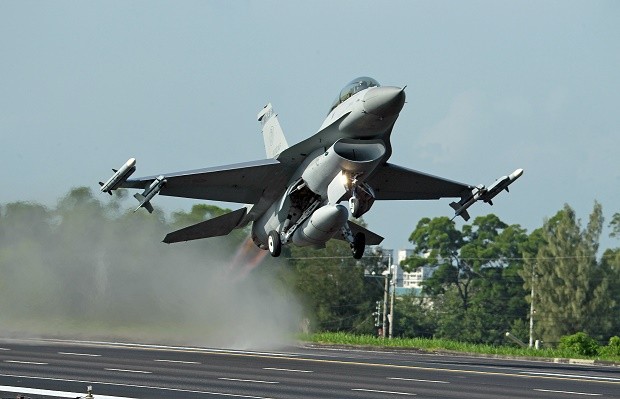China threatens US over $1.8B arms sale to Taiwan

In this Sept. 16, 2014 file photo, a Taiwan Air Force F-16 fighter jet takes off from a closed section of highway during the annual Han Kuang military exercises in Chiayi, central Taiwan. China on Wednesday, Dec. 16, 2015 strongly criticized an expected U.S. arms sale to Taiwan, saying it should be canceled to avoid harming relations between Taipei and Beijing. AP
WASHINGTON, United States — The Obama administration announced a $1.83 billion arms sale to Taiwan on Wednesday, drawing an immediate rebuke and threats of retaliation from Taipei’s rival Beijing.
The arms package is the first offered by the U.S. to the self-governing island in four years. Even before its announcement, Beijing, which regards Taiwan as part of its territory, demanded it be scrapped to avoid harming relations across the Taiwan Strait and between China and the U.S.
That was followed by a formal diplomatic protest late Wednesday, although at a lower level than in previous such instances.
“China resolutely opposes the sale of weapons to Taiwan by the U.S.,” Vice Foreign Minister Zheng Zeguang said in a meeting with Washington’s second-highest ranking diplomat in Beijing.
“In order to safeguard the nation’s interests, the Chinese side has decided to take necessary measures, including the imposition of sanctions against companies participating in the arms sale to Taiwan,” Zheng said, according to a statement posted on the ministry’s website.
Article continues after this advertisementSuch sanctions have been threatened in the past, although there’s no evidence they’ve had any meaningful effect. American and European Union companies are banned from selling military technology to China and Chinese companies have extensive links with major overseas firms that often have weapon-making divisions.
Article continues after this advertisementThe U.S. maintained there’s no need for it to hurt the relationship, which has also been strained by China’s island-building in the South China Sea and alleged cybertheft.
The administration notified Congress that the proposed arms package includes two decommissioned U.S. Navy frigates, anti-tank missiles, amphibious assault vehicles and Stinger surface-to-air missiles. There’s also support for Taiwan’s capabilities in intelligence, surveillance and reconnaissance and a weapons system to defend against anti-ship missiles.
Congress has 30 days to review the sale, but it’s unlikely to raise objections. There’s been mounting bipartisan concern that Taiwan is inadequately armed to defend itself against an increasingly powerful mainland China.
U.S. lawmakers welcomed the announcement. There were calls from both parties for more frequent arms sales to Taiwan.
New York Rep. Eliot Engel, the top-ranking Democrat on the House Foreign Affairs Committee, said the sale would contribute to peace and stability across the strait. “I wish we would see them on a regular basis,” he said.
The committee’s Republican chairman, California Rep. Ed Royce, said the administration had “needlessly dragged out” the approval process, and that other Taiwanese requests “have still not seen the light of day.”
Sen. John McCain, Republican chairman of the Senate Armed Services Committee, said the U.S. should avoid extended periods during which “fear of upsetting the U.S.-China relationship may harm Taiwan’s defense capabilities.”
The administration has announced more than $12 billion in arms sales to Taiwan since 2010, but none since $5.9 billion in sales in September 2011 that included upgrades for Taiwan’s F-16 fighter jets. That drew a high-level diplomatic protest from Beijing, which suspended some military exchanges with the United States. It did not seriously impair ties.
In the meantime, President Barack Obama has sought greater cooperation with China on issues such as climate change, and the two sides have increased military exchanges to reduce the risk of conflict.
State Department spokesman John Kirby said the U.S. was in contact Wednesday with both Taiwan and China about the sale, which he said was consistent with U.S. support for Taiwan’s ability to defend itself under the Taiwan Relations Act.
“There’s no need for it to have any derogatory effect on our relationship with China,” Kirby told reporters. “We still want to work to establish a better, more transparent, more effective relationship with China in the region and we’re going to continue to work at that.”
Also on Wednesday, Ma Xiaoguang, China’s spokesman for the Cabinet’s Taiwan Affairs Office, reiterated China’s opposition to arms sales to Taiwan from any country under any circumstances, and called for Taiwan to “treasure” improved relations with the mainland.
Relations across the Taiwan Strait have undergone a steady improvement over the past two decades, especially under the China-friendly administration of Taiwanese President Ma Ying-jeou.